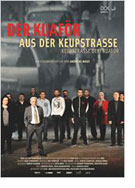

Opening 25 Feb 2016
Directed by:
Andreas Maus
Writing credits:
Andreas Maus, Maik Baumgärtner
Principal actors:
Jonas Baeck, Aylin Esener, Joachim Gauck, Hardy Krüger, Jürgen Roters
Imagine being the victim of a crime who is wrongly suspected and spied on for seven years before the real offenders are found. Your life falls apart; your family disintegrates; you are forced to hang on to your existence by the skin of your teeth. That is the topic of this fictional documentary, which exposes what the director, Andreas Maus, calls “institutional racism” within the German police force and legal system. In this case this term refers to ingrained prejudices against people of Turkish or Kurdish origin, reminiscent of the racial prejudices prevalent in places in the USA like Ferguson or Chicago.
The focus of this film is an attack that took place on June 9, 2004, when a bomb filled with nails exploded in front of a barber shop in Keuper St., Cologne. The shop was operated by a German citizen of Turkish origin, Özcan Yildirim. Several people were injured, but no one was killed, although similar attacks in other parts of Germany including Hamburg did lead to deaths. The police and investigating authorities immediately concluded that Mr. Yildirim must be part of some kind of Mafia activity and ignored any other explanation. Mr. Yildirim and others proposed that right wing terrorists might be the involved, but this explanation was not further pursued. The victims received no compensation or help in recovering from their injuries. Instead, secret agents were hired to observe them day in and day out and repeatedly confront them with flimsy evidence. Not until 2011 was it found that members of the neo-nazi group NSU (National Socialist Underground) were the real perpetrators.
The film moves back and forth between documentation in the form of recent interviews with the victims and play-acting based on authentic interrogation protocols to which the director had access. On the one hand viewers are confronted with highly moving interviews with the victims, who describe the effects of being considered perpetrators by the police and legal system. On the other hand you become a witness to very convincing excerpts from interrogation procedures that reveal the insidious way the victims were bullied. The result is a somber and disconcerting movie well worth seeing, although you have to be able to understand German or Turkish to follow it. It is especially timely in view of the xenophobic attacks directed at refugees in the past weeks. On the surface Germany seems to have heroically overcome its Nazi past, but the film makes you wonder just how deep the healing process really has been. (Pat Nevers)